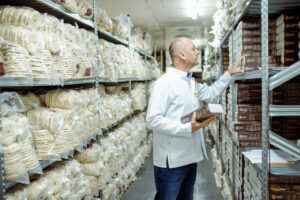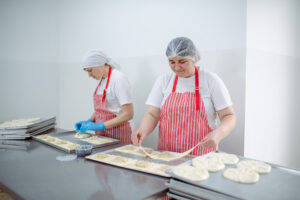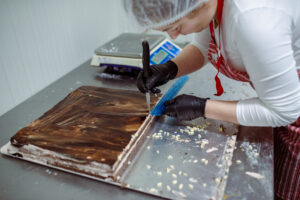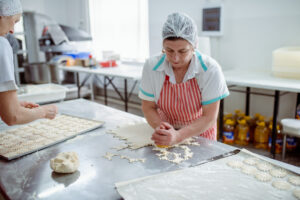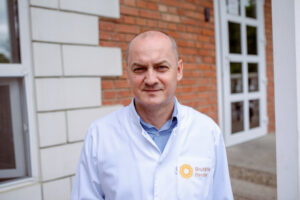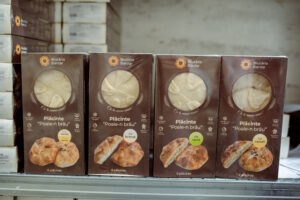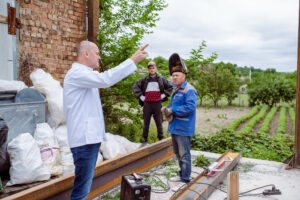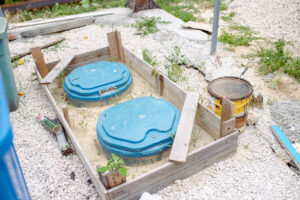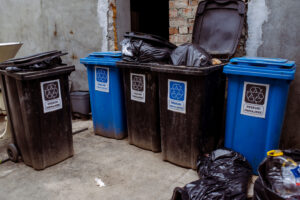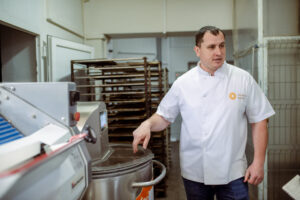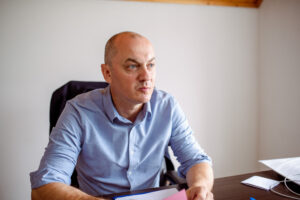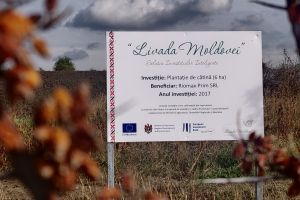
Bardar Bakery – a place that takes care of its employees, protects the environment, and welcomes children on excursions
Bardar Bakery was established in 2000 in Bardar, a village 15km south-west of Chisinau, in the Ialoveni district. Initially a family business, the last five years have seen production increase tenfold, with their products now available on the shelves of 170 shops in Romania.
The director and co-owner of the bakery, Victor Nistorică, has no intention of holding back expansion: he wants to export the company’s products to Israel, Germany and Ireland. “We focus on the Moldovan diaspora there. In addition, the bakery is introducing environmentally friendly methods into production: sewage treatment plants, grease traps, rainwater collection systems, waste collection and sorting.”
However, the director of the Bardar Bakery notes that business development and optimisation of work processes would not have been possible without the support of the European Union in the framework of the ‘Fruit Garden of Moldova’ project (‘Livada Moldovei’).
Bardar Bakery now has several departments for making pastries – from cakes to traditional Moldovan ‘placintas’ – round cakes with different fillings.
“We offer around 20 kinds of pastries, and 15 kinds of cakes. We also make macaroons and croissants. Last year, we started producing cakes, making them to order as well. Now we have more than 30-40 types of confectionery, and we are still growing,” says Victor Nistorică. But he adds that consumers have the strongest preference for the famous Poale-n Brâu handmade placintas.
Nistorică says the real revolution for the bakery started in 2018-2019, when the firm had the idea of frozen semi-finished products. He decided to invest in this area. With the help of the ‘Fruit Garden of Moldova’ project (‘Livada Moldovei’), the bakery received a loan of 3.3 million Moldovan lei. With this money, they bought a delivery van, a mixer, a divider, a laminator, processing equipment, an oven, a freezer, and a storage room.
‘We want people to feel like family here’
“There are approximately 30,000 placintas stored in freezers. They are only sold frozen. We sell some of the placintas in bulk, and the rest are distributed to smaller traders or even to homes directly. We wouldn’t be able to sell cakes if we didn’t have a refrigerated truck to deliver our products.”
The co-founder of the Bardar Bakery says his business shows an annual growth of 30-40%, with a daily production capacity of 3-4 tonnes. Around 35% of the total output is exported.
“In the next two years, we expect to export outside the country at least as much as we sell domestically. We have no plans to stop growing. We have increased our portfolio, as well as our domestic market share. Recently we started exporting on a huge scale. We work with Kaufland in Moldova and in Romania, where we deliver our products to more than 170 shops.”
The company has expanded its payroll from just 20 employees in 2018 to 55 in 2023. Most (90%) are from Bardar village. The working day at Bardar Bakery starts at 8am and ends at 5pm.
“Finding workers is not easy, but we try to position ourselves as an employer offering good working conditions. It’s not just a salary issue. It’s clean, it’s warm here, we ensure employees take breaks. We make people feel welcome here, like they are part of the family,” says Victor Nistorică.
‘We contribute to a healthy environment in the community’
Bardar Bakery uses environmentally-friendly methods in its production. These include sewage treatment plants, grease separators, rainwater collecting systems, waste collection, and sorting systems. All of these were installed as a result of the bakery’s own contribution to the ‘Fruit Garden of Moldova’ project (‘Livada Moldovei’).
“Part of our contribution to the partnership with the Moldova Orchard project was to improve the environmental component of the business. In this way, we built a sewage treatment plant, because here in the village the sewage system is not intended for industrial use. Accordingly, we separately installed a sewage treatment plant and a grease separator, because we work a lot with oils,” says Victor Nistorică.
The bakery also has a rainwater harvesting system, which is used in the technological processes. As a result, the bakery consumes less water from the local water supply system.
“As part of the greening programme, we have also started sorting waste. We have containers for plastic, paper, organic waste, etc. We work with a waste sorting company that comes and takes paper and plastic for recycling. In the short term, this benefits us in that we have reduced the cost of transporting waste. In the long term – we are contributing to a healthy environment in the community, we are not polluting the air and water,” says the bakery’s director and co-owner.
According to Victor Nistorică, participation in the EU-funded project has brought the bakery many benefits.
“The oven, mixer, fermenter, cold rooms – all this equipment was purchased as part of the project. We acquired a loan at a preferential rate, lower than the market rate. Another important point is that everything we buy under the project is free of VAT. Thanks to the loan of 3.3 million lei we did not have to pay 700,000 lei VAT on the purchase of equipment. It is a great advantage! We are already at the stage of getting another loan from ‘Livada Moldovei’,” says Victor Nistorică.
Solar panels and tourism
The bakery’s production capacity has increased, while making it more environmentally friendly. The owners now intend to introduce fully electronic management and to make production energy efficient. Moreover, the co-owner of the bakery is keen to attract tourists.
“We are about to start installing photovoltaic panels and a heat pump system. Installing photovoltaic panels will help us save a lot of resources. We will also be digitising all the processes. Right now, we have some processes that are still done on paper. We need to change that,” says Victor Nistorică. “Another component that we want to develop is tourism. Children now come to us for a tour. In May, we had a hundred children a day visiting us. We hold guided tours and master classes, and are looking forward to investing in a tasting room to attract tourists from far and wide.”
‘Livada Moldovei’ (Fruit Garden of Moldova project) is a credit line from the European Investment Bank worth more than €120 million for the modernisation of Moldova’s horticultural sector. Of this, €108 million are available for investment by private entrepreneurs.
Author: Petru Beșleaga
MOST READ
RELATED PROJECTS
SEE ALSO

No, time is not on Russia‘s side

How to open an art business in Moldova: the experience of Alexandra Mihalaș

Be one step ahead of a hacker: check simple cybersecurity tips!

How to act and move on: strategies for women facing discrimination and online harassment
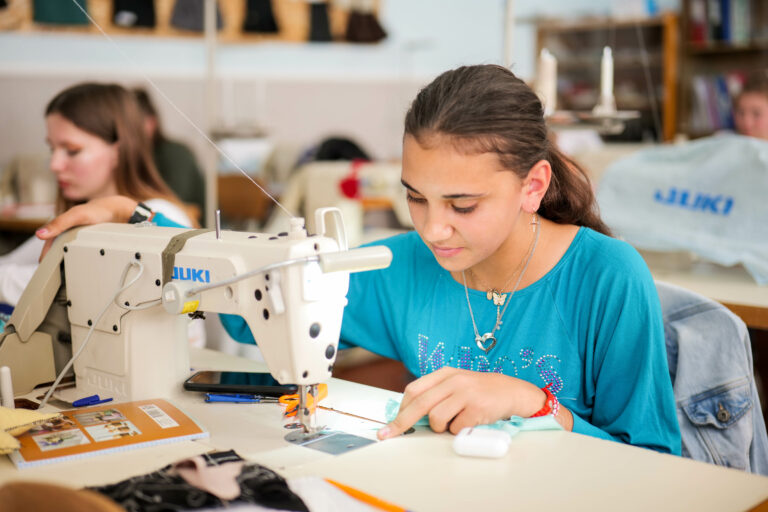
‘Learning is not a process but a journey’: the example of a school in Orhei
More campaign pages:
Interested in the latest news and opportunities?
This website is managed by the EU-funded Regional Communication Programme for the Eastern Neighbourhood ('EU NEIGHBOURS east’), which complements and supports the communication of the Delegations of the European Union in the Eastern partner countries, and works under the guidance of the European Commission’s Directorate-General for Neighbourhood Policy and Enlargement Negotiations, and the European External Action Service. EU NEIGHBOURS east is implemented by a GOPA PACE-led consortium. It is part of the larger Neighbourhood Communication Programme (2020-2024) for the EU's Eastern and Southern Neighbourhood, which also includes 'EU NEIGHBOURS south’ project that runs the EU Neighbours portal.

The information on this site is subject to a Disclaimer and Protection of personal data. © European Union,
